- LIFE
80 Elegant and Timeless French Baby Girl Names


Skunks, with their distinctive black and white fur, are often unwelcome guests in residential areas due to their digging habits and potent spray. If you’ve found patches of your lawn uprooted, skunks may be the culprits, searching for insects and grubs. Understanding how to keep skunks from digging up your lawn involves a combination of deterrence, natural remedies, and effective lawn maintenance. This guide offers practical solutions to protect your landscape from these nocturnal diggers.
To prevent skunks from making your lawn their personal buffet, employing specific tools for skunk deterrence is crucial. Motion-activated sprinklers can be particularly effective, startling skunks with a sudden burst of water. Additionally, installing solar-powered lights around your yard can disrupt their nocturnal habits, as skunks prefer to forage in the dark.
Position these devices strategically around areas where skunks frequently dig. Ensure they are set to activate at night when skunks are most active. This method is humane and environmentally friendly, using only water to deter the animals.
Place solar lights at various points in your yard to create an illuminated perimeter. The unexpected light can discourage skunks from venturing into your lawn, as they prefer darker, more secluded areas.
For those who prefer eco-friendly solutions, natural remedies and their effectiveness in repelling skunks should not be overlooked. Ingredients like cayenne pepper, garlic, and castor oil can be used to create a homemade repellent spray.
Mix water with a few tablespoons of cayenne pepper, minced garlic, and a dash of castor oil. Spray this mixture around the perimeter of your lawn and on any areas that show signs of digging. The strong smell and taste can deter skunks from returning.
Essential oils such as peppermint and eucalyptus can also act as natural deterrents. Soak cotton balls in these oils and place them in areas frequented by skunks. Refresh the oils every few days to maintain their potency.
Lawn treatment options for pest control are vital in reducing the primary attractants for skunks: grubs and insects. Regularly treating your lawn with appropriate pest control products can significantly decrease skunk activity.
Consider using organic pesticides that target grubs and other insects without harming the environment. Neem oil and diatomaceous earth are excellent choices for natural pest control.
If organic options are insufficient, chemical treatments specifically designed for grub control can be applied. Always follow the manufacturer’s instructions to ensure safe and effective application.
Fox urine is a natural deterrent, as skunks are instinctively wary of predators. This method involves applying commercially available fox urine around your property.
Apply the urine along the perimeter of your lawn and in areas where skunks are known to dig. Reapply after rain or every few weeks to maintain its effectiveness. While the smell may be unpleasant to humans, it is a powerful deterrent for skunks.
Maintaining a healthy lawn is an essential part of any skunk prevention strategy. A well-kept lawn is less likely to harbor the insects and grubs that attract skunks in the first place.
Keep your grass trimmed and well-watered. This not only enhances the appearance of your lawn but also discourages insects from settling.
Aerate your lawn annually and apply a balanced fertilizer to promote healthy grass growth. This can help prevent insect infestations by creating an inhospitable environment for them.

Pressure washing can play a role in skunk control by removing food sources and scents that may attract these animals. Regularly pressure wash areas like patios, decks, and driveways to eliminate food residues and odors.
Ensure that any food scraps or waste are cleaned thoroughly, as skunks are opportunistic feeders and may be drawn to these areas if scents linger.
Grub control is a critical component of preventing skunks from digging up your lawn. Effective grub control techniques include both natural and chemical methods.
Introduce beneficial nematodes to your lawn. These microscopic organisms naturally control grub populations by infecting and killing them.
Apply grub control treatments in the late summer or early fall when grubs are most active near the surface. This timing ensures maximum effectiveness in reducing grub populations.
By combining these strategies, homeowners can effectively deter skunks and protect their lawns. Implementing a mix of tools, natural remedies, and maintenance practices will create an environment that is uninviting to skunks, ensuring a healthy and beautiful lawn.